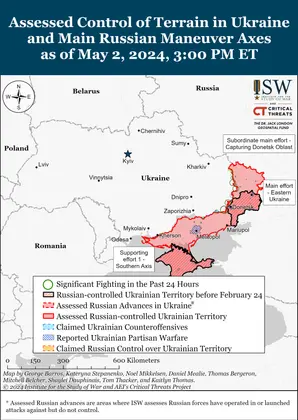Key Takeaways from the ISW:
- Ukrainian intelligence officials identified three Russian efforts to destabilize Ukraine and achieve victory, and both Ukrainian and US intelligence officials issued assessments about the battlefield situation that are consistent with prior ISW forecasts that Russian forces may take Chasiv Yar but are very unlikely to seize major Ukrainian cities.
- Ukrainian Main Military Intelligence Directorate (GUR) Deputy Chief Major General Vadym Skibitskyi assessed that Russian forces will likely begin an offensive effort towards Kharkiv and Sumy oblasts at the end of May or start of June 2024 but that Russian forces will not be able to take Kharkiv or Sumy cities.
- Skibitskyi noted that the Kremlin views information operations as a second line of effort to defeat Ukraine and that current Russian information operations heavily focus on undermining Ukrainian mobilization efforts and the legitimacy of Ukrainian President Volodymyr Zelensky.
- Skibitskyi stressed that Russia’s third line of effort to achieve victory in Ukraine is an ongoing campaign to diplomatically isolate Ukraine.
- The US Department of State (DoS) announced on May 1 that it has determined that Russian forces are violating the Chemical Weapons Convention (CWC), to which Russia is a signatory.
- Russian President Vladimir Putin met with Tula Oblast Governor and known Wagner Group-affiliate Alexei Dyumin on May 2, further indicating that Putin may be seeking to reduce Russian Defense Minister Sergei Shoigu's power by balancing him with rivals.
- Putin likely deliberately publicized his meeting with Dyumin following the high-profile arrest of Russian Deputy Defense Minister Timur Ivanov on April 24 and before the presidential inauguration on May 7, possibly to punish the Shoigu-led MoD for failing to accomplish the Kremlin’s military goals.
- The Putin-Dyumin meeting suggests that Putin is likely the responsible decision-maker behind Ivanov’s arrest.
- Recent Russian government crackdowns against Central Asian migrants living in and entering Russia following the March 22 Crocus City Hall attack appear to be straining Kyrgyz-Russian relations in addition to Tajik-Russian relations.
- The Georgian parliament passed Georgia’s Russian-style “foreign agents” law in its second reading on May 1 amid continued protests against the law in Tbilisi.
- Russian forces recently made confirmed advances west of Avdiivka.
- The Russian military may have recruited numerous prisoners with convictions for serious crimes in fall of 2023.
JOIN US ON TELEGRAM
Follow our coverage of the war on the @Kyivpost_official.
See the original here.
To suggest a correction or clarification, write to us here
You can also highlight the text and press Ctrl + Enter
You can also highlight the text and press Ctrl + Enter








